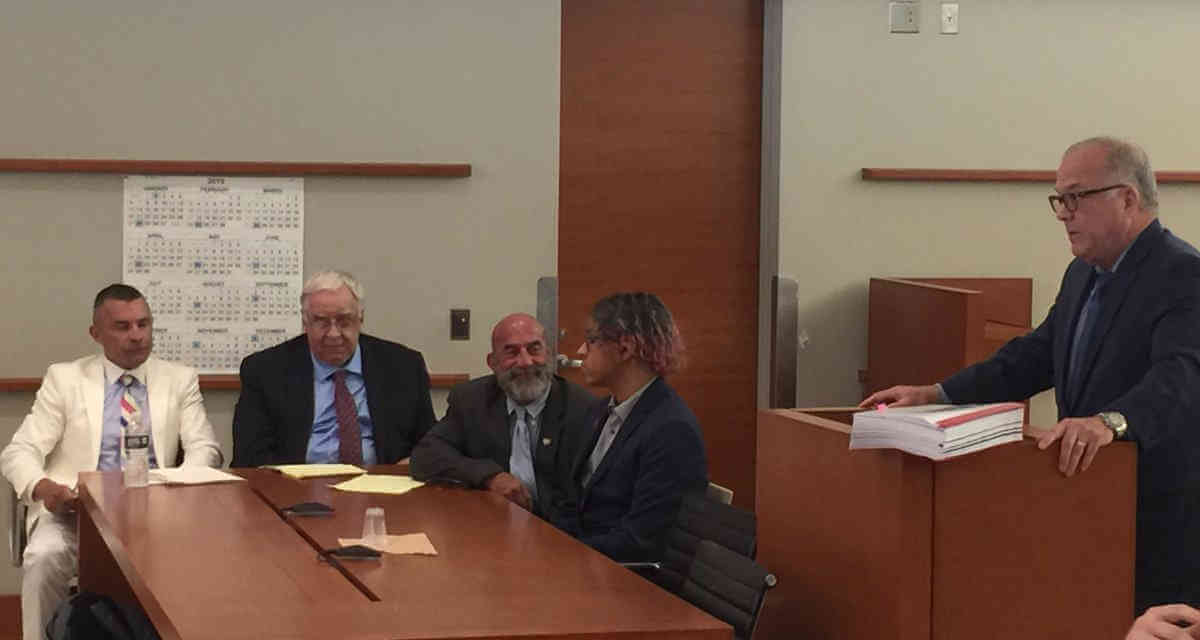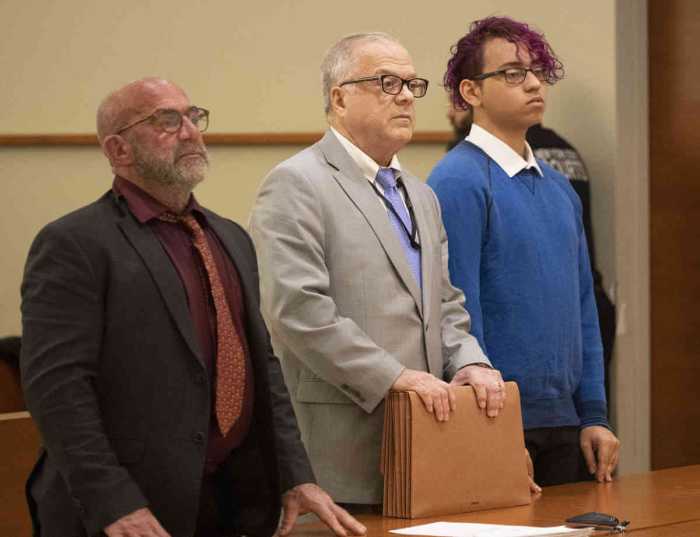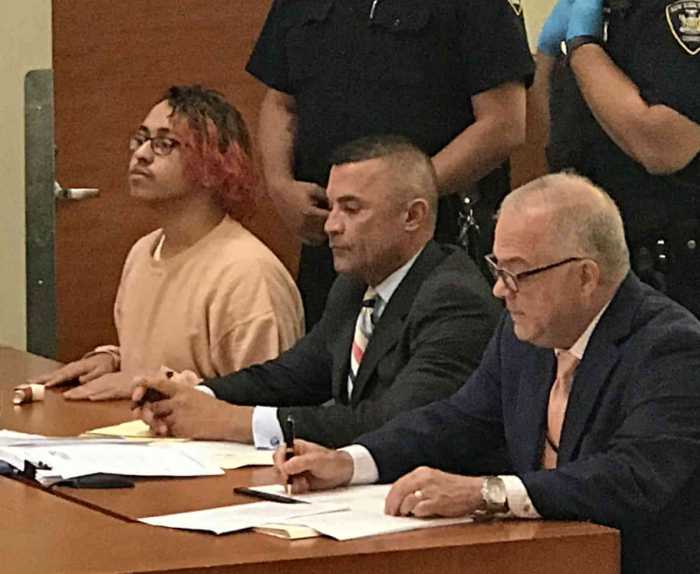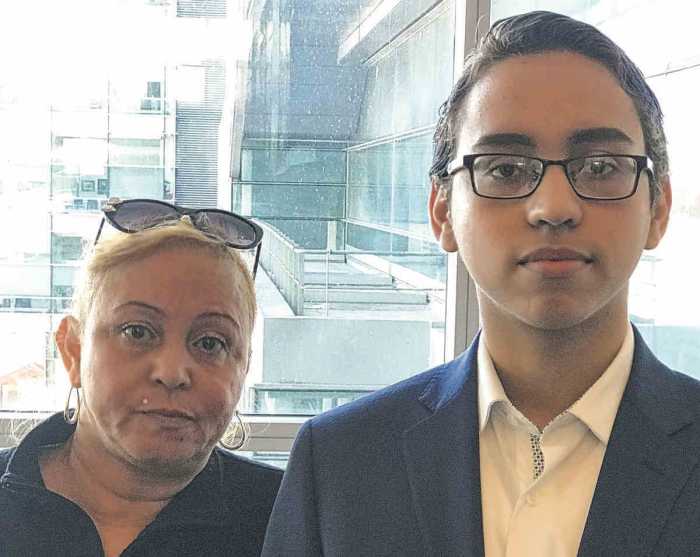Closing statements from defense attorney Christopher R. Lynn and prosecutor Nancy Borko, a Bronx assistant district attorney, brought the manslaughter trial of Abel Cedeno, a bullied gay youth charged in the 2017 death of classmate Matthew McCree as well as an assault on McCree’s friend, Ariane LaBoy, to a close on Friday.
The difference in the two presentations turned on the state of mind of Cedeno on the day of the fatal encounter, with the defense portraying the defendant as displaying a knife to ward off what he feared would be a fatal attack by McCree and the prosecution asserting that Cedeno brought the knife to school “bent on creating an opportunity to use” the weapon to “prove that he’s not a pussy… to prove that he’s tough.”
While Lynn’s summation went over the evidence in considerable detail to demonstrate why Cedeno would have a “reasonable” fear that his life was in danger, justifying his own use of deadly force, Borko was briefer and seemingly confident that the evidence from more than 20 witnesses would show otherwise beyond a reasonable doubt. At times, she was mocking in her characterization of Cedeno’s testimony on the stand the day before.
The opposing attorneys sparred over the details of a tragic encounter that began when Cedeno became angry over what he said was a stream of paper wads, pens, and pencils tossed at him from behind in his American history class at the now defunct Urban Assembly School for Wildlife Conservation in the Bronx. After leaving the classroom briefly, he returned and, complaining about the things thrown at him, shouted, “You’re all pussy.” Several student witnesses said those were fighting words and also variously attributed to him the phrases “pull up,” “get up,” and “what’s popping” — each of which different witnesses said were fighting words, as well.
Lynn pointed to testimony from the two teachers in the classroom — Paul Jacoby and Nikolai Kennedy — as well as a student witness who was friends with McCree and LaBoy, Frankie Santiago, which describe McCree moving aggressively from the back of the room toward Cedeno, while the gay youth remained frozen in place. Jacoby said the dead youth had moved “with an aggressive purpose and [was] getting ready for a confrontation,” while Kennedy testified that Cedeno had remained “stationary.” McCree, Jacoby said, pushed him aside as he tried to block the youth’s advance toward the front of the room. Santiago said once the fight between McCree and Cedeno began, “Everyone had gotten up, especially the kids from the back. They get up and go attack Abel.”
From those accounts, Lynn concluded that “escape” was “impossible” for Cedeno, and he pointed to the defendant’s statement on the stand that “When you fear for your life you cannot move.”
His client, Lynn said, only took his knife out when he saw McCree shove teacher Jacoby out of the way and no adult stood between him and his attacker.
Cedeno “believed that unless he did it, he was going to die,” Lynn argued. The attorney also stated, “Abel’s sole purpose in the use of the knife was to protect himself from physical harm. His purpose was to deter aggression.”
Cedeno, Lynn argued, “was never the aggressor, and that he was absolutely forced to act as he did to stop this attack. Abel believed that his attackers, using their fists, were intent upon causing him and could inflict upon him deadly physical force.”
At that point, Lynn referred to Cedeno’s belief that both McCree and LaBoy were gang members, evidence the judge had not allowed in the trial. When Borko objected, Judge Michael A. Gross, who is hearing and deciding the case without a jury, said he would give Lynn leeway and only consider what was in evidence. Both sides, in fact, mentioned things in their summations that had been barred from use as evidence and Gross allowed all of those arguments to be voiced.
With Cedeno’s “first line of defense gone,” once Jacoby was shoved out of the way, Lynn concluded, his client acted as any “reasonable person” would to defend himself. That, the defense asserted, qualified legally as “justification” — the term used for a claim of self-defense.
Opening her summation by describing “a dark scene of massacre” that left McCree, who was 15, dead and LaBoy, who joined the fight after his friend had been stabbed, “scarred physically and emotionally” from several stab wounds himself.
Borko focused on what the prosecution argues was the intentionality of Cedeno’s actions — the purchase of an illegal knife (though Lynn argued his client had searched Google to find out what knives were legal in New York before placing his order on Amazon) and even of a bow and arrow in the months prior to the school fight.
The prosecutor also alluded to Cedeno sending a friend a video demonstrating how he could use the knife.
The defendant, Borko said, “was set on creating an opportunity to use it.”
His motivation, she said, was to “prove he’s not a pussy… prove he’s tough.” Borko later derisively referred to Cedeno as someone trying to be “a big man with a big mouth.”
Despite Cedeno’s testimony about his years of being bullied and his family’s unsuccessful attempts to get him a transfer to another school, Borko argued, “Whatever bullying in his past had nothing to do with anyone in that classroom.” In fact, Cedeno has said he never had any previous run-ins with either McCree or LaBoy.
He did, however, testify that McCree had beaten up his friend Branden, a claim Borko minimized by noting that the defendant seemed not to even know exactly who McCree was since he misidentified a picture of LaBoy as McCree during the trial.
Despite the fact that her witnesses recalled different fighting words they said Cedeno used, the prosecutor said it all amounts to the same thing: the defendant aimed to provoke a fight in which he could use his knife. His claims he had endured “a barrage” of things thrown at him at the outset is not substantiated by any pictures of the classroom floor taken by police after the deadly fight, Borko said.
She also belittled Cedeno’s repeated claims on the stand that he was simply flailing his arms around as McCree and later LaBoy punched him and he, in turn, stabbed them. The stab wound McCree suffered — two to two-and-a-half inches deep — “doesn’t happen with someone’s arms flailing,” she said. “He was deliberate and forceful.”
If Cedeno, in fact, feared for his life, Borko said, “all he had to do was take a step back and leave the room.” Instead, she asserted, he “charged” at McCree.
The responsibility for the tragic encounter, the prosecutor concluded, “rests squarely on Abel Cedeno’s shoulders.” The gay youth, she said, deserves conviction on first-degree manslaughter in McCree’s death, first-degree assault on LaBoy, and criminal possession of a weapon in the fourth-degree.
Since Cedeno waived his right to a jury trial, Gross will rule on his guilt or innocence. The judge adjourned the case until July 15 at 3:30 p.m.




































